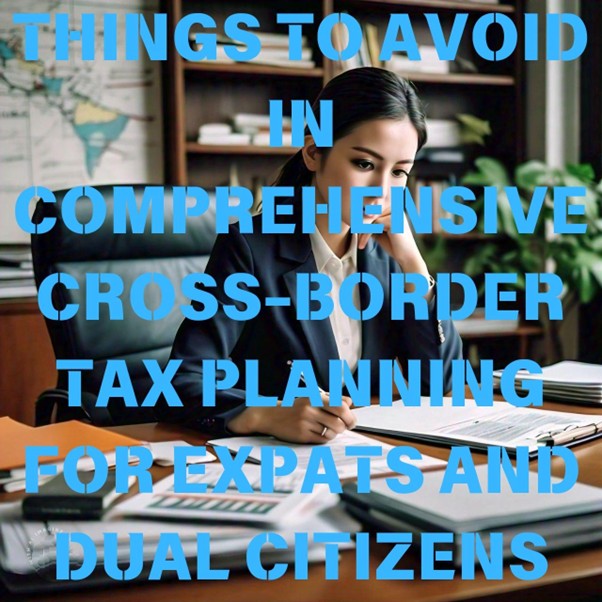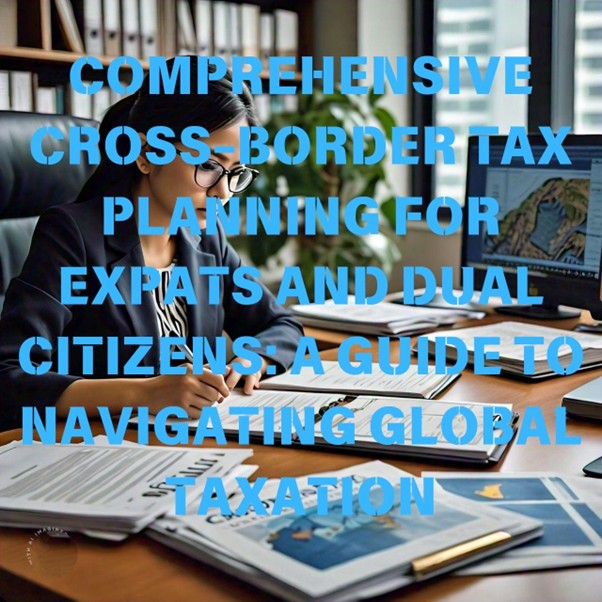COMPREHENSIVE CROSS-BORDER TAX PLANNING FOR EXPATS AND DUAL CITIZENS: A GUIDE TO NAVIGATING GLOBAL TAXATION
Comprehensive cross-border tax planning is crucial for expats and dual citizens navigating global taxation. As a Canadian tax expert and financial advisor in Ontario, I’ve seen first-hand the complexities that expats and dual citizens face when navigating cross-border taxation. With the rise of globalization, more individuals are living and working abroad, creating a intricate web of tax obligations. In this comprehensive guide, we’ll delve into the world of cross-border tax planning, addressing common pain points and offering practical solutions to ensure you’re in compliance with tax authorities worldwide.
UNDERSTANDING CROSS-BORDER TAXATION
Before diving into the nitty-gritty of cross-border tax planning, it’s essential to grasp the basics of global taxation. When an individual becomes a tax resident in a foreign country, they’re subject to taxation on their worldwide income. This can lead to double taxation, where the same income is taxed in multiple jurisdictions.
COMMON PAIN POINTS FOR EXPATS AND DUAL CITIZENS

1. Double Taxation: Being taxed on the same income in multiple countries, resulting in a significant tax burden.
2. Complex Tax Filings: Navigating multiple tax systems, forms, and deadlines, leading to confusion and stress.
3. Foreign Tax Credits: Understanding how to claim foreign tax credits to minimize tax liability in multiple countries.
4. Tax Residency: Determining tax residency status in multiple countries, and understanding the implications on taxation.
5. Income Splitting: Optimizing income splitting strategies to minimize tax liability in multiple countries.
6. Tax-Deferred Savings: Understanding how to utilize tax-deferred savings vehicles, such as RRSPs and 401(k)s, as an expat or dual citizen.
7. Estate Planning: Developing an estate plan that addresses the complexities of cross-border taxation and inheritance laws.
8. Currency Fluctuations: Managing the impact of currency fluctuations on investments, income, and expenses.
9. Lack of Tax Guidance: Difficulty finding qualified tax professionals who understand the complexities of cross-border taxation.
10. Compliance and Penalties: Ensuring compliance with tax laws and regulations in multiple countries, and avoiding penalties for non-compliance.
SOLUTIONS FOR EXPATS AND DUAL CITIZENS

1. Consult a Tax Expert: Work with a qualified tax professional who understands cross-border taxation and can provide personalized guidance.
2. Tax Planning Strategies: Implement tax planning strategies, such as income splitting, foreign tax credits, and tax-deferred savings, to minimize tax liability.
3. Tax Residency Planning: Develop a tax residency plan that optimizes tax residency status in multiple countries.
4. Estate Planning: Create an estate plan that addresses cross-border taxation, inheritance laws, and asset protection.
5. Currency Management: Develop a currency management strategy to mitigate the impact of currency fluctuations on investments, income, and expenses.
6. Tax Compliance and Reporting: Ensure compliance with tax laws and regulations in multiple countries, and accurately report income and assets.
7. Tax Software and Tools: Utilize tax software and tools, such as tax preparation programs and currency conversion tools, to streamline tax planning and compliance.
8. Education and Resources: Stay informed about cross-border taxation through educational resources, such as webinars, articles, and tax guides.
9. Tax Advocacy: Work with a tax advocate who can represent your interests and navigate complex tax issues on your behalf.
10. Regular Review and Updates: Regularly review and update your tax plan to ensure compliance with changing tax laws and regulations.
BEST TAX PLANNING STRATEGIES FOR EXPATS

As an expat, navigating complex tax laws and regulations in multiple countries can be overwhelming. To minimize tax liabilities and ensure compliance, it’s essential to implement effective tax planning strategies. Here are some of the best tax planning strategies for expats:
I. Pre-Departure Planning
1. Understand tax implications: Research tax laws and regulations in your destination country.
2. Notify tax authorities: Inform tax authorities in your home country of your departure.
3. Consider tax residency: Determine tax residency status in your destination country.
II. Income Tax Planning
1. Claim foreign earned income exclusion: Exclude foreign earned income from taxation in your home country.
2. Utilize foreign tax credits: Claim foreign tax credits to minimize tax liability in your home country.
3. Optimize income splitting: Split income with family members to minimize tax liability.
III. Investment and Wealth Planning
1. Utilize tax-deferred savings: Invest in tax-deferred savings vehicles, such as RRSPs or 401(k)s.
2. Consider offshore investments: Invest in offshore investments, such as international mutual funds or exchange-traded funds.
3. Develop an estate plan: Create an estate plan that addresses cross-border taxation and inheritance laws.
IV. Retirement Planning
1. Understand pension and retirement plans: Research pension and retirement plans in your destination country.
2. Consider international retirement plans: Invest in international retirement plans, such as Qualifying Recognized Overseas Pension Schemes (QROPS).
3. Optimize retirement income: Optimize retirement income to minimize tax liability.
V. Tax Compliance and Reporting
1. File tax returns: File tax returns in your home country and destination country.
2. Report foreign assets: Report foreign assets, such as bank accounts and investments.
3. Maintain accurate records: Maintain accurate records of income, expenses, and tax-related documents.
VI. Seeking Professional Advice
1. Consult a tax professional: Consult a tax professional who understands expat taxation.
2. Seek financial planning advice: Seek financial planning advice to optimize investment and wealth planning.
3. Stay informed: Stay informed about changes to tax laws and regulations.
By implementing these tax planning strategies, expats can minimize tax liabilities, ensure compliance, and optimize their financial situation.
PRACTICAL SOLUTIONS FOR EXPATS AND DUAL CITIZENS IN CANADA ONTARIO

TAX PLANNING SOLUTIONS
1. Consult a Canadian Tax Expert: Work with a qualified tax professional who understands Canadian and international tax laws to ensure compliance and optimize tax planning.
2. Claim Foreign Tax Credits: Claim foreign tax credits to minimize tax liability in Canada and avoid double taxation.
3. Utilize Tax-Deferred Savings: Utilize tax-deferred savings vehicles, such as Registered Retirement Savings Plans (RRSPs) and Tax-Free Savings Accounts (TFSAs), to optimize savings and reduce tax liability.
FINANCIAL PLANNING SOLUTIONS
1. Develop a Comprehensive Financial Plan: Create a personalized financial plan that addresses investment, tax, estate, and retirement planning.
2. Invest in a Diversified Portfolio: Invest in a diversified portfolio that takes into account your risk tolerance, investment goals, and tax situation.
3. Utilize Currency Exchange Services: Utilize currency exchange services to manage currency fluctuations and optimize international transactions.
ESTATE PLANNING SOLUTIONS
1. Create a Will and Powers of Attorney: Create a will and powers of attorney that address your unique situation as an expat or dual citizen.
2. Develop an Estate Plan: Develop an estate plan that addresses cross-border taxation, inheritance laws, and asset protection.
3. Utilize Trusts and Other Estate Planning Tools: Utilize trusts and other estate planning tools to optimize estate planning and minimize tax liability.
IMMIGRATION AND CITIZENSHIP SOLUTIONS
1. Consult an Immigration Lawyer: Consult an immigration lawyer to ensure compliance with Canadian immigration laws and regulations.
2. Apply for Permanent Residency or Citizenship: Apply for permanent residency or citizenship to secure your status in Canada.
3. Understand Your Rights and Obligations: Understand your rights and obligations as a permanent resident or citizen of Canada.
Practical Tips
1. Keep Accurate Records: Keep accurate records of your income, expenses, and tax-related documents to simplify tax planning and compliance.
2. Stay Informed: Stay informed about changes to Canadian tax laws and regulations that may affect your situation.
3. Seek Professional Advice: Seek professional advice from a qualified tax professional, financial advisor , or immigration lawyer to ensure compliance and optimize planning.
By implementing these practical solutions and staying informed about Canadian tax laws and regulations, expats and dual citizens in Ontario can optimize their financial situation, ensure compliance, and achieve their long-term goals.
THINGS TO AVOID IN COMPREHENSIVE CROSS-BORDER TAX PLANNING FOR EXPATS AND DUAL CITIZENS

As an expat or dual citizen, navigating global taxation can be complex and overwhelming. To ensure you’re in compliance with tax laws and regulations in multiple countries, it’s essential to avoid common pitfalls and mistakes. Here are things to avoid in comprehensive cross-border tax planning:
Tax-Related Mistakes
1. Failure to File Tax Returns: Failing to file tax returns in one or multiple countries can result in penalties, fines, and even criminal prosecution.
2. Inaccurate or Incomplete Tax Filings: Providing inaccurate or incomplete information on tax filings can lead to audits, penalties, and fines.
3. Not Claiming Foreign Tax Credits: Failing to claim foreign tax credits can result in double taxation and a significant tax burden.
4. Not Reporting Foreign Assets: Failing to report foreign assets, such as bank accounts and investments, can lead to penalties and fines.
Financial Planning Mistakes
1. Not Diversifying Investments: Failing to diversify investments can result in significant financial losses and tax liabilities.
2. Not Utilizing Tax-Deferred Savings: Failing to utilize tax-deferred savings vehicles, such as RRSPs and 401(k)s, can result in missed tax savings opportunities.
3. Not Considering Currency Fluctuations: Failing to consider currency fluctuations can result in significant financial losses and tax liabilities.
Estate Planning Mistakes
1. Not Having a Will: Failing to have a will can result in intestacy, leading to significant tax liabilities and estate planning complexities.
2. Not Considering Cross-Border Taxation: Failing to consider cross-border taxation in estate planning can result in significant tax liabilities and complexities.
3. Not Utilizing Trusts and Other Estate Planning Tools: Failing to utilize trusts and other estate planning tools can result in missed tax savings opportunities and estate planning complexities.
Immigration and Citizenship Mistakes
1. Not Understanding Immigration Laws and Regulations: Failing to understand immigration laws and regulations can result in significant complexities and penalties.
2. Not Maintaining Proper Documentation: Failing to maintain proper documentation, such as passports and visas, can result in significant complexities and penalties.
3. Not Seeking Professional Advice: Failing to seek professional advice from a qualified immigration lawyer can result in significant complexities and penalties.
Other Mistakes
1. Not Staying Informed: Failing to stay informed about changes to tax laws and regulations can result in significant complexities and penalties.
2. Not Seeking Professional Advice: Failing to seek professional advice from a qualified tax professional or financial advisor can result in significant complexities and penalties.
3. Not Keeping Accurate Records: Failing to keep accurate records, such as tax returns and financial statements, can result in significant complexities and penalties.
By avoiding these common mistakes and pitfalls, expats and dual citizens can ensure compliance with tax laws and regulations, minimize tax liabilities, and achieve their long-term financial goals.
FREQUENTLY ASKED QUESTIONS
As an expat or dual citizen, navigating global taxation can be complex and overwhelming. Here are some frequently asked questions on comprehensive cross-border tax planning to help you better understand your tax obligations and opportunities:
Tax Residency and Obligations
- What determines tax residency?
Tax residency is typically determined by the country where you have a permanent home, family ties, or economic connections.
- What are my tax obligations as an expat?
As an expat, you’re typically required to file tax returns in your country of residence and may also be required to file tax returns in your home country.
- How do I report foreign income?
You’ll need to report foreign income on your tax return in your country of residence and may also need to report it in your home country.
Tax Credits and Deductions
- What is a foreign tax credit?
A foreign tax credit is a tax credit you can claim in your home country for taxes paid in a foreign country.
- How do I claim foreign tax credits?
You’ll need to file Form T1135 with the Canada Revenue Agency (CRA) or equivalent forms in other countries.
- What deductions can I claim as an expat?
You may be able to claim deductions for foreign housing, education expenses, and other eligible expenses.
Tax Planning Strategies
- What is income splitting?
Income splitting is a tax planning strategy that involves splitting income with family members to minimize tax liability.
- How can I optimize my tax-deferred savings?
You can optimize your tax-deferred savings by contributing to registered retirement savings plans (RRSPs) or tax-free savings accounts (TFSAs).
- What is the benefit of a cross-border financial plan?
A cross-border financial plan can help you optimize investment, tax, and estate planning, minimizing tax liabilities and ensuring compliance.
Estate Planning and Succession
- What is the impact of cross-border taxation on estate planning?
Cross-border taxation can have significant implications for estate planning, including tax liabilities and inheritance laws.
- How can I ensure a smooth transfer of assets?
You can ensure a smooth transfer of assets by developing an estate plan that addresses cross-border taxation and inheritance laws.
- What is the role of trusts in cross-border estate planning?
Trusts can play a significant role in cross-border estate planning, providing a tax-efficient way to transfer assets and manage inheritance.
Seeking Professional Advice
- Why do I need a tax professional?
A tax professional can help you navigate complex tax laws and regulations, ensuring compliance and optimizing tax planning.
- How do I find a qualified tax professional?
You can find a qualified tax professional by asking for referrals, checking professional certifications, and researching their experience with cross-border taxation.
- What questions should I ask a tax professional?
You should ask a tax professional about their experience, qualifications, and approach to cross-border taxation, as well as any specific questions you have about your tax situation.
By understanding these frequently asked questions, expats and dual citizens can better navigate global taxation and ensure compliance with tax laws and regulations.
CONCLUSION
Navigating global taxation as an expat or dual citizen can be complex and overwhelming. However, with the right guidance and planning, you can minimize tax liabilities, ensure compliance, and achieve your long-term financial goals.
In this comprehensive guide, we’ve covered the essential aspects of cross-border tax planning, including:
1. Understanding tax residency and obligations
2. Navigating tax credits and deductions
3. Implementing tax planning strategies
4. Addressing estate planning and succession
5. Seeking professional advice
By following these guidelines and seeking professional advice, you can ensure that your cross-border tax planning is comprehensive, effective, and tailored to your unique situation.
CALL-TO-ACTION
If you’re an expat or dual citizen looking for personalized cross-border tax planning solutions, we invite you to:
1. Book a consultation with our team of qualified tax professionals.
2. Take advantage of our comprehensive cross-border tax planning services.
3. Ensure compliance with tax laws and regulations in multiple countries.
4. Minimize tax liabilities and optimize your financial situation.
5. Achieve your long-term financial goals with confidence.
Don’t navigate global taxation alone. Let our team of experts guide you through the complexities of cross-border tax planning.
CONTACT US
To book a consultation or learn more about our cross-border tax planning services, please contact us:
Email: sjohn@glhaccounting.ca
We look forward to helping you navigate the complexities of global taxation and achieve your financial goals.
ABOUT AUTHOR
Shanel John is a dedicated Certified Public Accountant (CPA) at G.L.H. Accounting, specializing in Income Tax with 10 years of experience. Based in Brampton, Ontario, Canada, Shanel offers expertise in tax preparation, financial accounting, and advisory services. A certified QBO Pro Advisor, Shanel’s decade-long experience and knowledge make her a trusted figure in the accounting field.
ADDITIONAL RESOURCES
REGISTERED RETIREMENT SAVINGS PLAN (RRSPs): https://www.canada.ca/en/revenue-agency/services/tax/individuals/topics/rrsps-related-plans/registered-retirement-savings-plan-rrsp.html
QUALIFYING RECOGNIZED OVERSEAS PENSION SCHEMES (QROPS): https://www.gov.uk/guidance/check-the-recognised-overseas-pension-schemes-notification-list
TAX-FREE SAVINGS ACCOUNT (TFSAs): https://www.canada.ca/en/revenue-agency/services/tax/individuals/topics/tax-free-savings-account.html

